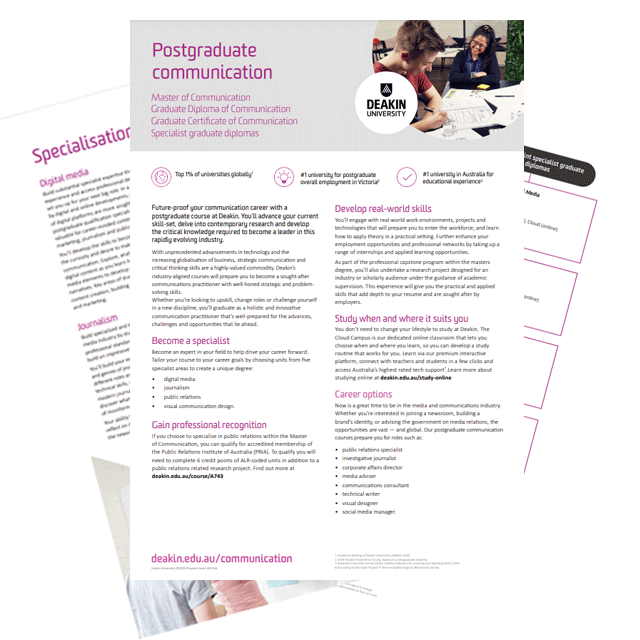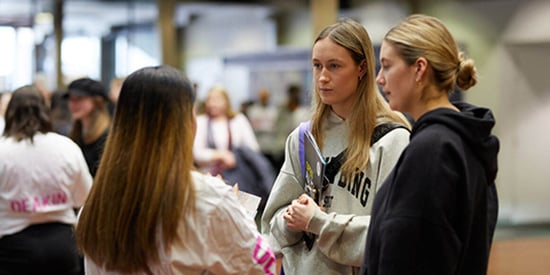Tailor your degree to your own interests
Graduate with PRIA membership^
Start sooner with three intakes a year
Key facts
Duration
1-2 years full time or part time equivalent depending on your entry point
Locations
Key dates
Direct applications to Deakin for Trimester 2 2024 close 23 June 2024
Direct applications to Deakin for Trimester 3 2024 close 27 October 2024
Current Deakin Students
To access your official course details for the year you started your degree, please visit the handbook
Course overview
Gain advanced analytical, research and communication skills by undertaking multi-disciplinary Master of Communication degree. Explore the different specialisations offered at Deakin University today.
Deakin’s Master of Communication is a stimulating course which creates professionals with advanced knowledge of and skills in communications and media industries. The course recognises the advances in communication technologies and the increasing globalisation of business enterprises.
You can choose to undertake intensive study in the areas of Journalism, TV production, Visual Communication Design, Public Relations or Digital Media, or undertake cross-disciplinary units from these disciplines.
The flexible course structure allows you to build on your knowledge base so you can move across professional fields, acknowledging that a broader range of skills is required to remain competitive in the ever-changing media and cognate industries. All students complete a professional research project designed for business or creative audience under the guidance of an academic supervisor.
Deakin’s Master of Communication will advance your career prospects in one of the fastest growing group of industries such as content production companies, multimedia businesses, government agencies, marketing and entertainment industries, public relations, and social and market research entities. Students who undertake 4 credits in the independent scholarly research project will be eligible to apply for a PhD.
Read MoreCourse information
- Award granted
- Master of Communication
- Deakin code
- A743
- CRICOS code?
- 084000E
- Approval status
- This course is approved by the University under the Higher Education Standards Framework.
- Australian Qualifications Framework (AQF) recognition
The award conferred upon completion is recognised in the Australian Qualifications Framework at Level 9.
Course structure
To qualify for the Master of Communication, a student must successfully complete 16 credit points of study comprising:
Either
> 8 credit points in one of the specialisation options (Digital Media, Journalism, Public Relations, Television Production, Visual Communication Design)
Or
> 8 credit points of Cross-disciplinary Study which must be drawn from at least 3 or more of the following areas of study: Digital Media, Journalism, Public Relations, Television Production or Visual Communication Design
Plus
2 credit points of research methods (ACX702)
2 credit points of communication concepts (ACX701); and
Either
> A further 4 credit points of independent scholarly research project (ACX703, ACX704, ACX705, ACX706)
Or
> 2 credit points of independent professional practice project (ACX707, ACX708); and
> 2 credit points of elective units from any of the specialisations in the course
Intakes by location
The availability of a course varies across locations and intakes. This means that a course offered in Trimester 1 may not be offered in the same location for Trimester 2 or 3. Check each intake for up-to-date information on when and where you can commence your studies.

Take the next step to a brighter future
Kickstart your career growth. We'll prepare you for the career you've always wanted.
Download course guideEntry requirements
FEE-HELP calculator
What is FEE-HELP?
FEE-HELP loans cover up to 100% of tuition fees for eligible students. By taking out a FEE-HELP loan, the government pays your tuition fees directly to Deakin, and the balance is repaid from your employment income - but only once you're earning over $51,550.
Please note: fees shown by the calculator are indicative only and based on 2024 rates. Actual fees may vary. We advise confirming fees with Prospective Student Enquiries prior to enrolment.
Estimate your FEE-HELP
FEE-HELP payments
per pay cycle
Take-home pay
after FEE-HELP and tax
per pay cycle
Your estimated FEE-HELP repayments
- $* is the estimated full cost for a Master of Communication (16 credit points), based on the 2024 fees.
- is the annual FEE-HELP payment, based on your current salary
- of your current salary be spent on FEE-HELP
*Disclaimer
Deakin University (Deakin):
- gives no warranty and accepts no responsibility for the currency, accuracy or the completeness of the information provided;
- advises users that no reliance should be placed upon on the information provided, and;
- instructs users that they should confirm the actual course fee with Prospective Student Enquiries prior to enrolment.
This tool provides indicative information about the fees that will be payable in respect of courses and subjects offered to prospective students domiciled in Australia during the periods indicated.
Please note that the fees shown by the calculator are indicative only and actual fees may vary. Users are advised to confirm the actual course fee with Prospective Student Enquiries prior to enrolment.
The estimated course fee is based on the tuition fee costs applicable to a domestic full time student commencing the course in Trimester 1 and studying full time for the duration of the course but:
- does not include non-tuition costs that may apply, such as Student Services and Amenities Fees (SSAF);
- does not take into account any scholarships or bursaries awarded to the student (including the 10% Deakin alumni discount);
- assumes the maximum number of units that need to be successfully completed actual number completed may be reduced if recognition of prior learning is granted;
- assumes that no exceptional, or non-typical, circumstances apply to the proposed course of study;
- assumes that the options that the user selects are appropriate for the course of study that they intend to undertake;
- where fees are estimated for future years those fee will be subject to annual increases in accordance with increases in the cost of course delivery.
Scholarship options
A Deakin scholarship might change your life. If you've got something special to offer Deakin – or you just need the financial help to get you here – we may have a scholarship opportunity for you.
Postgraduate bursary
If you’re a Deakin alumnus commencing a postgraduate award course, you may be eligible to receive a 10% reduction per unit on your enrolment fees.
Apply now
Some of our courses have limited places available - for the latest on courses still open for application, visit Courses by trimester.
Create an account in the Deakin Application Portal, start your application, enter personal details, education experience, upload supporting documents and submit. Need help? Play this video, or contact one of our friendly future student advisers on 1800 693 888 or submit an online enquiry.
For more information on the application process and closing dates, see the How to apply webpage. If you're still having problems, please contact us for assistance.
Research Information
Students will undertake a practice-based research methods and design unit worth 2 credit points and a significant independent research project worth 4 credit points resulting in the completion of a major creative work and exegesis. A two credit point research project option is available.
Contact information
Arts and Education Student Services and Enrolment Enquiries
Burwood (Melbourne)
Tel 03 9246 8100
artsed@deakin.edu.au
Cloud (online)
Tel 03 5227 1359
artsed@deakin.edu.au
Careers
Want a degree that’s more than just a qualification? Our industry connections, world-class facilities and practical approach to learning are just some of the reasons why Deakin students graduate confident and ready to thrive in the jobs of tomorrow.
Professional recognition
Students taking the Public Relations stream may qualify for membership of the Public Relations Institute of Australia (PRIA) by completing 6 credit points of ALR-coded units.
Course learning outcomes
Deakin's graduate learning outcomes describe the knowledge and capabilities graduates can demonstrate at the completion of their course. These outcomes mean that regardless of the Deakin course you undertake, you can rest assured your degree will teach you the skills and professional attributes that employers value. They'll set you up to learn and work effectively in the future.
| Deakin Graduate Learning Outcomes | Course Learning Outcomes |
| Discipline specific knowledge and capabilities | Acquire advanced and integrated understanding of one or more complex knowledge domains relating to professional communication Demonstrate expert knowledge and specialist skills in contemporary communication methods, and their application in one or more specialist areas of communication including Journalism, Professional Writing, Public Relations, Television Production and Visual Communication Design and in scholarly contexts |
| Communication | Use specialist cognitive and technical skills in communicating ideas, problems and arguments in a variety of modes in a range specialist areas of communication and in scholarly research |
| Digital literacy | Acquire specialist skills in generic and specific digital technologies used to address a range of communication needs in research and professional contexts and for diverse audiences within and outside the communications industry |
| Critical thinking | Acquire expert cognitive skills in the analysis and critical evaluation of communications theory and its application in professional practice and scholarship Demonstrate the ability to evaluate complex ideas, develop appropriate methodologies and communicate conclusions in the context of professional decision making and scholarship |
| Problem solving | Use expert and specialised knowledge of and skills in communications to identify, investigate, analyse and synthesise complex information, problems and concepts and develop creative solutions in professional practice and scholarly contexts |
| Self-management | Employ high level autonomy, accountability and initiative in responding creatively to new situations in professional practice and/or in the completion of a substantial research –based project |
| Teamwork | Demonstrate initiative and accountability in working and learning collaboratively in professional communications practice and scholarly contexts |
| Global citizenship | Acquire high level understanding and the ability to reflect on issues in communications in both domestic and global contexts as a scholar and in professional practice, taking into consideration cultural and socio-economic diversity, social and environmental responsibility and the application of the highest ethical standards |
| Approved by Faculty Board May 2014 | |
Events Explore more events
Footnotes
** QS World University Rankings by Subject 2020




